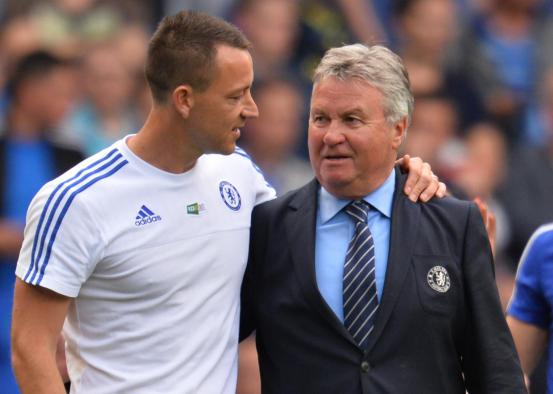- Commissioner’s statement on Ventura, Marte
- Ronnie O’Sullivan: Masters champion ‘felt so vulnerable’ in final
- Arron Fletcher Wins 2017 WSOP International Circuit Marrakech Main Event ($140,224)
- Smith challenges Warner to go big in India
- Moncada No. 1 on MLB Pipeline’s Top 10 2B Prospects list
- Braves land 2 on MLB Pipeline’s Top 10 2B Prospects list
- Kingery makes MLB Pipeline’s Top 10 2B Prospects list
- New Zealand wrap up 2-0 after Bangladesh implosion
- Mathews, Pradeep, Gunathilaka to return to Sri Lanka
- Elliott hopes for rain for Poli
What Has Guus Hiddink Left Behind at Chelsea?
- Updated: May 16, 2016

STAMFORD BRIDGE, London — Chelsea’s Premier League season finale ended against Leicester City in the way their campaign should have started: With Guus Hiddink playing the kids.
Come the final whistle, Ruben Loftus-Cheek, Tammy Abraham and Fikayo Tomori were all on the pitch for Chelsea, making a contribution as they take another step on the road to establishing themselves.
Loftus-Cheek has become a more familiar face this season, while Abraham and Tomori were each making their home debuts for the senior side.
With nothing on the line against Leicester, it raises the question of why Hiddink didn’t start the game with them? What could Chelsea have lost that they haven’t already this season? What was there to gain by playing an unfit Branislav Ivanovic at the heart of defence?
The questions are plenty, although the answers to them all will be equally unsatisfactory.
For all the positives Hiddink has brought to Chelsea since December, his use of the club’s younger talents has frustrated. From starting to slowly introduce them, recent weeks have seen the interim manager seemingly slam on the brakes.
That hasn’t been a positive move. If anything, it makes the 11 draws picked up during his tenure all the more frustrating for Chelsea fans.
When Hiddink first came to the club in 2009, the outlook was much different. The squad he was inheriting from Luiz Felipe Scolari was experienced and contained many players in their prime. The likes of Frank Lampard, Michael Ballack, Didier Drogba and John Terry gave Chelsea a formidable look.
It’s been different with this generation. Chelsea don’t have that same swagger and are lacking the mettle to dominate opponents like they did.
In 2009, Hiddink’s target was very much about sustaining the club’s success. His mission was still a rescue, but with the players he had, there was still an expectation he should be achieving something.
The Dutchman delivered on that mandate by winning the FA Cup and nearly taking Chelsea to their second UEFA Champions League final in a row. Had it not been for some questionable refereeing decisions from Tom Henning Ovrebo, he would have. Instead, it was Barcelona who got to face—and beat—Manchester United in Rome.
In 2016, Hiddink needed to restore …
continue reading in source www.bleacherreport.com
